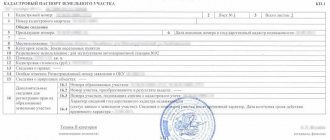The Supreme Court decided whether part of the site could be used for other purposes
Whether it is possible to use part of the land plot not in accordance with the type of permitted use is decided by the Economic Board in proceedings No. A40-244225/2019. The Central Fuel Company went to court and appealed the fine of 700,000 rubles. according to Part 1 of Art. 8.8 Code of Administrative Offences. The company received a fine for placing a cafe, online store, offices and car service in its building, although the site was intended for “vehicle maintenance”. At the same time, the land was also used for its intended purpose. The company owned the building, and it rented the site under a 2017 agreement from the Moscow City Property Department.
The Constitutional Court considered a complaint against the provision of the Code of Administrative Offenses on fines for misuse of land
Two authorities sided with the company and canceled the fine. As they explained, the land lease agreement was prepared in accordance with the old classifier of types of permitted use of plots (approved by order of the Ministry of Energy dated September 1, 2014 N 540). In the original formulation, the type of permitted use included not only “garages, parking lots, gas stations,” but also “related trade stores, buildings for public catering,” and so on. In addition, the provision of a site for the operation of a building located on it allows its use not in accordance with urban planning regulations, two authorities indicated.
The Moscow District AC turned out to have a different opinion: the company committed a violation because it used the site not in accordance with the type of use, which is documented and recorded in the real estate cadastre. The classifier, approved in 2014, changed already in 2015, information about the type of permitted use of the site was entered into the Unified State Register of Real Estate in 2016. The land lease agreement was concluded after all these events, in 2017. This means that offices, cafes, and an online store could not be located on the site for servicing vehicles, concluded the AS MO.
In the Supreme Court
The company did not agree with this decision. Her arguments were heard by the Economic College troika on February 3. According to the representative of the plaintiff, lawyer Alexander Zak, the building in question is the former automobile plant No. 22 of Moskhlebtrans. This is a fairly large facility, where from the very beginning there were offices and a cafe. “Any complex administrative building involves different types of use,” the lawyer urged. “There may be a cafe and other facilities there.”
According to Zach, the cassation court went beyond the scope of the appeal because it considered the argument that the type of use did not comply with the real estate register; There was no such argument in the original ruling. In addition, if you take the Unified State Register of Real Estate, you will see that it indicates two types of use: not only “vehicle maintenance”, but also “for the placement of industrial and administrative buildings, structures, industrial facilities, and public utilities.” These are two equivalent uses, Zach noted. According to him, previously the type of use of the site was determined by the lease agreement, but now it is necessary to focus on the rules of land use and development.
He also criticized the position of Rosreestr: according to the lawyer, the government agency changed its position on the case several times, appealing either to the text of the agreement or to the rules of land use and development. “The task of an administrative body is to identify and prevent offenses, and not to look for a way to punish at any cost,” Zach said.
“The task of an administrative body is to identify and prevent offenses,
and not look for a way to punish at any cost.”
Dmitry Sukhov, a representative of Rosreestr, did not agree with this. He recalled that the lease agreement with the department did not provide for offices, cafes, or an online store. According to new classifiers, this is a road service facility. If the classifiers have changed, but the company has not inspected it, then it is to blame, it has ignored the requirements of the law, the Rosreestr lawyer assured.
Sukhov emphasized the principle of payment for land use. “If there are cafes, offices and shops on the territory, this is a completely different cadastral value,” he explained. “This means that the fee for use is not transferred in full, and the budget receives less money.” And entering information from the Unified State Register into the site is one of the ways to determine the fee, Sukhov pointed out.
“If there are cafes, offices and shops, this is a completely different cadastral value.”
Zach responded to these statements in the replica stage. In particular, he stated that “if there was a violation, it was necessary to recover unjust enrichment.” And when the judges left for a meeting, the lawyer criticized the authorities’ approach using another example: “What happens if you install an ATM in an office building, then you immediately need to add “banking activities”?
After the meeting, the troika announced a decision: to cancel all decisions in the case and send it for a new trial.
- Evgenia Efimenko
- Economy Board of the Armed Forces
The procedure for providing land plots
Application forms, lists of documents for the provision of a land plot (date of posting - 08/26/2020)
Samples of completed applications (posting date: 08/26/2020)
In accordance with the current land legislation, the department performs the following functions:
- provision of ownership (free or for a fee), lease, permanent (perpetual) use, gratuitous use of land plots in municipal ownership, without bidding in accordance with clause 2 of article 39.3 of the Land Code of the Russian Federation, clause 2 of art. 39.6, Art. 39.5, Art. 39.9, Art. 39.10 of the Land Code of the Russian Federation, Decree of the Perm city administration dated 09/04/2015 No. 624 “On approval of the administrative regulations for the provision by the Department of Land Relations of the Perm city administration of municipal
The procedure for acquiring a land plot without bidding into ownership free of charge or for a fee, for rent, for permanent perpetual use, acquisition of a land plot for ownership or lease by the owner of a building, structure located on a land plot, with the exception of the acquisition of a land plot for individual housing construction, gardening
The procedure for acquiring a land plot on which an unfinished construction project is located to complete its construction one time without bidding (lease for 3 years)
- provision of free ownership and lease of municipally owned land plots to members of a horticultural, gardening or dacha non-profit association and their horticultural, gardening or dacha non-profit associations in accordance with clause 3 of Art. 39.5 of the Land Code of the Russian Federation, clause 2, clause 7 of Article 39.6 of the Land Code of the Russian Federation, Resolution of the Perm city administration dated November 5, 2015 No. 912 “On approval of the administrative regulations for the provision by the department of land relations of the Perm city administration of municipal
The procedure for acquiring a plot of land without bidding for ownership for a fee, for rent for individual housing construction, gardening
The procedure for acquiring a plot of land without bidding for ownership for a fee or for rent for gardening by members of a non-profit organization created by citizens for gardening, vegetable gardening, and summer cottage farming
The procedure for acquiring ownership of a land plot by members of a horticultural, gardening or dacha non-profit association free of charge in accordance with the Federal Law “On the entry into force of the Land Code of the Russian Federation of October 25, 2001 No. 137-FZ”
— preliminary approval of the provision of a land plot located in municipal ownership in accordance with Art. 39.15 of the Land Code of the Russian Federation, Resolution of the Perm city administration dated 09/04/2015 No. 625 “On approval of the administrative regulations for the provision by the department of land relations of the Perm city administration to municipal
- redistribution of land plots in municipal ownership and land plots in private ownership (Chapter V.4 of the Land Code of the Russian Federation) Resolution of the Perm city administration dated 10/12/2015 No. 744 “On approval of the administrative regulations for the provision of land relations by the city administration Perm municipal
The procedure for the redistribution of land intended for gardening, individual housing construction, privately owned, and lands and (or) land plots in state or municipal ownership
— issuing a decision on the placement of objects on lands or land plots that are municipally owned in the territory of the city of Perm, without the provision of land plots and the establishment of easements, in accordance with paragraph 3 of Article 39.36 of the Land Code of the Russian Federation.
The procedure and conditions for placing objects on lands or land plots in municipal ownership are established by the Administrative Regulations for the provision by the Department of Land Relations of the Perm Municipal Administration, approved by Resolution of the Perm City Administration dated July 10, 2017 No. 517. “Issuing a decision on the placement of objects on lands or land plots in municipal ownership on the territory of the city of Perm, without the provision of land plots and the establishment of easements"
— issuance of permission to use land or a land plot located in municipal ownership, in accordance with Article 39.34 of the Land Code of the Russian Federation.
Changing the type of permitted use of a land plot leased to individuals or legal entities
— the issuance of a permit to use land or a land plot , state ownership of which is not demarcated, is carried out in the manner established by the Administrative Regulations for the provision by the Department of Land Relations of the Municipal Administration of the City of Perm, approved by Resolution of the Administration of the City of Perm dated October 30, 2017 No. 968.
Issuance of permission to use land or a land plot that is municipally owned on the territory of the city of Perm, without the provision of land plots and the establishment of an easement
— coordination of the location of the boundaries of land plots in accordance with Article 39 of the Federal Law of July 24, 2007 No. 221-FZ “On the State Real Estate Cadastre”, clause 3.5 of the decision of the Perm City Duma of February 24, 2015 No. 39 “On approval of the Regulations on the Department of Land Relations administration of the city of Perm"
Coordination of the location of the boundaries of land plots adjacent to land plots in municipal ownership on an individual basis
— approval of the layout of a land plot or land plots on the cadastral plan of the territory
Approval of the layout of a land plot or land plots on the cadastral plan of the territory
— conclusion of an agreement on the establishment of an easement in relation to a land plot located in municipal ownership in accordance with Chapter V.3 of the Land Code of the Russian Federation
— issuance of copies of archival documents confirming the right to own land Resolution of the Perm city administration dated February 17, 2012 No. 63 “On approval of the administrative regulations for the provision by the department of land relations of the Perm city administration of the municipal
Issuance of copies of archival documents confirming the right to land ownership
Provision of land plots for residential buildings
The provision of land plots is of an application nature. It should be taken into account that there are restrictions on the provision of ownership of land plots, the presence of which should result in a refusal to provide land plots.
The list of documents confirming the applicant’s right to purchase a land plot without holding a tender was approved by Order of the Ministry of Economic Development of the Russian Federation dated January 12, 2015 No. 1 “On approval of the list of documents confirming the applicant’s right to purchase a land plot without holding a tender”
Provision of land plots in the city of Perm
According to clause 1 of article 39.3 and clause 1 of article 39.6 of the Land Code of the Russian Federation, the sale of land plots in state and municipal ownership, the conclusion of lease agreements for such land plots is carried out at auction, except for the cases provided for in clause 2 of article 39.3 and clause 2 of Article 39.6 of the Land Code of the Russian Federation.
The organizer of auctions for the sale of land plots in state and municipal ownership, and auctions for the right to conclude lease agreements for such land plots is the Department of Property Relations of the Perm City Administration (Sibirskaya St., 14).
Information about land plots planned for sale at auction is posted on the website of the Perm city administration in the “Trading platform” section and in the Official Bulletin of local government bodies of the municipal formation of the city of Perm.
Thus, you can exercise the right to acquire land plots by submitting an application to the Department of Property Relations (Sibirskaya St., 14) to participate in an auction for the sale of land plots or the right to conclude a land lease agreement.
Decisions on the formation of land plots provided at auctions (competitions, auctions) in accordance with the powers are made by the Department of Urban Planning and Architecture of the Perm City Administration (Sibirskaya St., 15).
Re-registration of the right of permanent (perpetual) use
Land plots previously provided to legal entities with the right of permanent (indefinite) use are subject to re-registration in accordance with the Federal Law of October 25, 2001 No. 137-FZ “On the entry into force of the Land Code of the Russian Federation”, which provides for the obligation of legal entities, with the exception of state and municipal institutions, state-owned enterprises, state authorities and local governments, re-register the right of permanent (perpetual) use of land plots for the right to lease or acquire land plots as a property at their own request until 07/01/2012 in accordance with the rules of Article 39.20 established by Chapter V.1 Land Code of the Russian Federation.
The consequences of violating the terms and procedure for re-registering the right of permanent (perpetual) use are established by the Code of the Russian Federation on Administrative Offenses, which provides for the imposition of an administrative fine on legal entities in the amount of twenty to one hundred thousand rubles.
To re-register the right of permanent (perpetual) use, legal entities must contact the Department of Land Relations (Sibirskaya St., 15, document reception office, ground floor) with the appropriate application and documents necessary to make a decision on re-registration of this right.
Assigning an address to a land plot if the land plot is to be formed in accordance with the layout of the land plot on the cadastral plan of the territory.
The procedure for assigning, changing and canceling addresses, including requirements for the address structure, is established in accordance with the Rules for assigning, changing and canceling addresses, approved by Decree of the Government of the Russian Federation of November 19, 2014 N 1221.
If the Department of Land Relations of the Perm City Administration makes a decision on preliminary approval of the provision of a land plot or approval of the layout of the land plot on the cadastral plan of the territory, the Department of Land Relations of the Perm City Administration no later than 1 business day from the date of issuance of the order of the head of the Department of Land Relations of the Perm City Administration (hereinafter referred to as – order of the head of the subsidiaries and affiliates) sends a copy of the order of the head of the subsidiaries and affiliates to the Department of Urban Planning and Architecture of the Perm City Administration (hereinafter referred to as the DGA) for assigning an address.
An act on assigning an address to a land plot to be formed in accordance with the layout of the land plot on the cadastral plan of the territory (hereinafter referred to as the Act) is approved by the DCA within no more than 18 working days from the date of receipt of the order of the head of the subsidiary and dependent company.
The DSA enters information about the assignment of an address into the state address register within 3 working days from the date of approval of the act.
Information from Rosreestr of the Perm Territory on legislative changes in the field of land and real estate for the third quarter of 2021
Other meanings of this word:
- in Russia at the beginning of the 20th century. (after the Stolypin agrarian reform of 1906) - field land due to the peasant from communal lands, united into one plot and assigned to individual ownership
- In Russia at the beginning of the 20th century, a plot of land allocated from communal land into individual peasant ownership
- in tsarist Russia: a plot of land allocated as personal property to a peasant when he leaves the community
- A probable state when you drink more vodka than you can, but less than you wanted
- a plot of land allocated to peasants upon leaving the community
- A plot of land allocated from communal land
- Peasant's land
- Peasant land plot
- Peasant land allotment.
- Peasant allotment
- Peasant allotment.
- Peasant's personal land
- log splitting point
- The place where the tree was cut or sawn
- Peasant's allotment
- Separate area
- A separate plot allocated from any land into someone's ownership
- A separate piece of peasant land
- Peasant's separate allotment
- passed out
- cross section of a tree
- Cross section of a tree, log
- sawing
- Cut across
- The state of having had too much to drink
- Condition after a dose of vodka
- Method of allocating land in the process of abolition of serfdom
- A plot of land in Tsarist Russia
- A plot of land in Tsarist Russia.
- A plot of land allocated (in 1906-16) as personal property to a peasant when he left the community
- a plot of land allocated (in 1906–16) as personal property to a peasant upon his leaving the community
- A plot of land allocated to a peasant during the Stolypin reform
- A plot of land allocated to a peasant as personal property when he leaves the community, the main element of the agrarian reform of the early 20th century
- A plot of land allocated to a peasant as personal property when he leaves the community, the main element of the agrarian reform of the early 20th century
- a plot of land allocated to a peasant as personal property when he leaves the community is the main element of the agrarian reform of the early 20th century
- Form of peasant farming in Rus'
Common ownership of a land plot may arise as a result, for example, of the acceptance of an inheritance by several heirs, the acquisition of a land plot by spouses during marriage at the expense of the spouses’ common funds, etc. It happens that a plot of land has to be divided.
But a land plot can be divisible and indivisible. It depends on this property whether the claim for the division of a land plot or the allocation of a share from it will be satisfied. Let us remind you that the owners can divide a land plot by agreement. And only if no agreement is reached, the dispute over the division of the land plot will be resolved by the court.
Currently, the Land Code of the Russian Federation does not define a divisible land plot. Previously, according to Art. 6 of the Land Code of the Russian Federation, a divisible plot was defined as a plot that can be divided into parts, each of which, after division, forms an independent land plot, the permitted use of which can be carried out without transferring it to land of a different category, with the exception of cases established by federal laws. Since 2008, paragraph 2 of Art. 6 of the Land Code of the Russian Federation, containing this definition, has lost force.
The concepts of divisible and indivisible land can be formulated from a systematic analysis of legislative norms.
In accordance with Art. 133 of the Civil Code of the Russian Federation, a thing, the division of which in kind is impossible without changing its purpose and which acts in circulation as a single object of real rights, is an indivisible thing even if it has component parts.
An indivisible land plot is a land plot, the division of which cannot be carried out without violating the requirements for the formed or changed land plots (Article 39.20 of the Land Code of the Russian Federation). In relation to such a land plot, it is impossible to establish ownership of its part; it acts as an object of land and civil rights in general.
A divisible land plot is a plot that can be divided into parts and, when divided, forms two or more independent land plots, the permitted use of which for their intended purpose is possible without transferring it to land of a different category.
The requirements for the formed and changed land plots are established in Art. 11.9 Land Code of the Russian Federation.
The condition for the divisibility of a land plot is the preservation of its permitted use and category, as well as those not mentioned in Art. 6 of the Land Code of the Russian Federation, the minimum size of a land plot. The criterion for maintaining the established permitted use of a land plot is important mainly within the boundaries of the category of land in settlements and is not universal in nature.
This conclusion follows from the fact that the permitted use of a land plot means its use in accordance with town planning regulations, and the latter are not established in relation to agricultural land, forest fund lands, reserve lands and some other categories of land (Part 6 of Article 36 of the Town Planning Code RF).
The criteria for the divisibility or indivisibility of land plots include, among other things, the following: the size of the land plot formed as a result of merger or division must not exceed the maximum size of land plots provided for in Art. 38 of the Town Planning Code of the Russian Federation; dividing a land plot into two or more is permitted only if there are independent entrances and approaches to each formed land plot.
The above principles and criteria are specified in Articles 11.2 - 11.9 of the Land Code of the Russian Federation, which regulate legal relations regarding the formation of new land plots during the division, merger, redistribution of land plots or allocation from land plots, as well as from lands in state or municipal ownership.
Only common ownership of an undivided land plot
An indivisible land plot as an object of right of two or more persons, due to its special natural properties, is allowed to exist only as common property.
If a building, structure, located on a land plot, the division of which cannot be carried out without violating the requirements for the formed or changed land plots, or premises in the specified building, structure belong to several persons by private property rights, or several buildings, structures are located on such a land plot , owned by several persons on the right of private ownership, these persons have the right to purchase such a plot of land into common shared ownership or for rent with a plurality of persons on the side of the tenant (Clause 2 of Article 39.20 of the Land Code of the Russian Federation).
How to register land ownership if it is in perpetual use?
In accordance with the Land Code of the Russian Federation, it is permissible to re-register plots of land from lease to ownership. Acquiring ownership means acquiring the ability to dispose of real estate at your own discretion without any restrictions (other than those established by law).
How to transfer land from perpetual use to ownership
To transfer a plot of land from lease, which is not limited to a certain period, to ownership, be sure to obtain a resolution from the administration of the municipality in which the plot is located. However, before that, register it with the cadastral register, where it will be assigned the appropriate number, and receive a cadastral passport.









